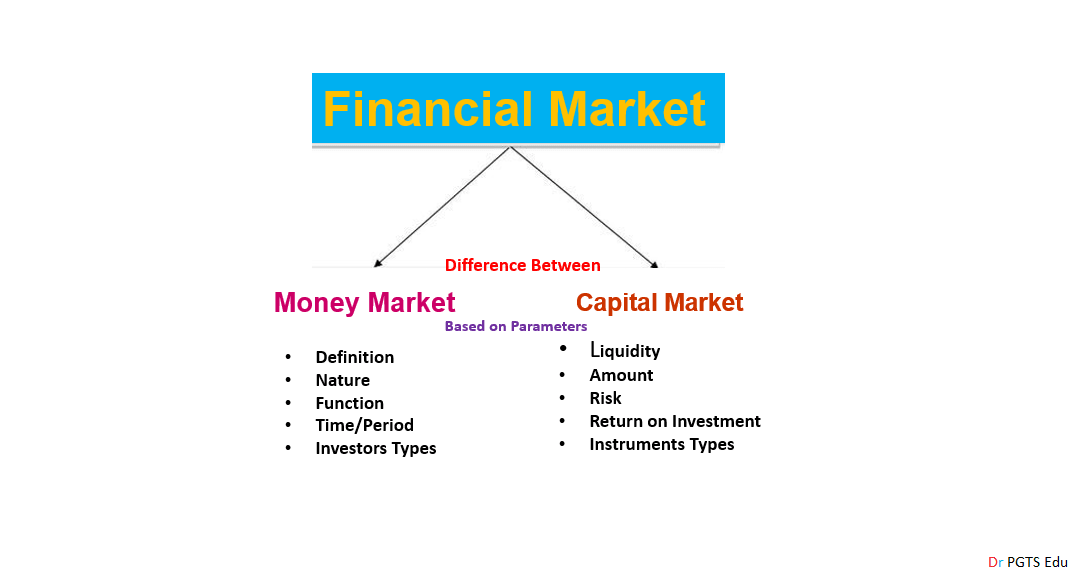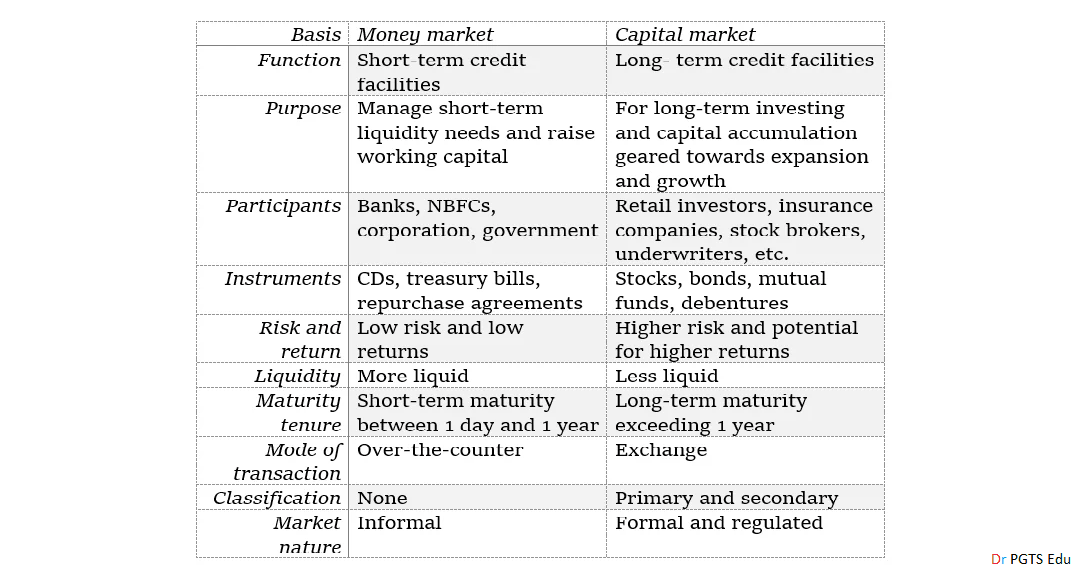Money Market vs. Capital Market the financial system plays a crucial role in the economic development of a country. Among the many components of the financial system, money markets and capital markets serve distinct purposes. Both are essential for economic stability and growth, but they differ in terms of meaning, usage, functions, advantages, and drawbacks. Understanding these differences will help you make informed investment decisions.
Money Market and Capital Market Meaning
Money Market
The money market is a segment of the financial market where short-term financial instruments are traded. These instruments have high liquidity and maturities of less than one year. The money market facilitates quick lending and borrowing, ensuring businesses and governments meet their short-term funding needs.
Capital Market
The capital market deals with long-term financial instruments, where businesses and governments raise capital for expansion and development. It includes markets for stocks, bonds, and other long-term securities. The capital market plays a crucial role in wealth creation and economic growth.
Usage of Money Market and Capital Market
Money Market Usage
- Used by businesses to manage short-term liquidity needs.
- Governments use it to adjust short-term funding gaps.
- Investors use money market instruments like Treasury bills and commercial paper to park surplus funds.
Capital Market Usage
- Corporations issue stocks and bonds to raise funds for long-term growth.
- Governments issue long-term securities for infrastructure development.
- Investors participate to generate wealth through long-term investments.
Key Differences Between Money Market and Capital Market
| Feature | Money Market | Capital Market |
|---|---|---|
| Time Horizon | Short-term (less than a year) | Long-term (more than a year) |
| Risk Level | Low risk | Higher risk |
| Liquidity | High | Moderate to low |
| Returns | Lower returns | Potential for higher returns |
| Instruments | Treasury bills, commercial paper, certificates of deposit | Stocks, bonds, debentures |
| Participants | Banks, financial institutions, government | Companies, investors, stock exchanges |
Functions of Money Market and Capital Market
Functions of the Money Market
- Ensures liquidity for businesses and governments.
- Helps in monetary policy implementation.
- Facilitates short-term borrowing and lending.
- Reduces financial risks by offering low-risk instruments.
Functions of the Capital Market
- Facilitates long-term investment and capital formation.
- Helps businesses raise funds for expansion.
- Promotes economic growth through wealth creation.
- Provides investment opportunities for individuals and institutions.
Merits and Demerits of Money Market and Capital Market
Merits of the Money Market
- High liquidity ensures quick access to funds.
- Low-risk investment options.
- Stabilizes the financial system by managing short-term credit needs.
Demerits of the Money Market
- Offers lower returns compared to the capital market.
- Limited options for long-term wealth accumulation.
Merits of the Capital Market
- Provides long-term investment opportunities.
- Helps businesses grow by providing necessary capital.
- Potential for high returns over time.
Demerits of the Capital Market
- Higher risk due to market fluctuations.
- Requires expertise to make informed investment decisions.
- Limited liquidity compared to money market instruments.
Money Market vs. Capital Market in India
In India, both markets play a significant role in economic development.

Money Market in India
- Regulated by the Reserve Bank of India (RBI).
- Includes instruments like Treasury Bills (T-Bills), Commercial Paper (CP), and Certificates of Deposit (CDs).
- Key players include banks, mutual funds, and financial institutions.
Capital Market in India
- Regulated by the Securities and Exchange Board of India (SEBI).
- Includes the National Stock Exchange (NSE) and Bombay Stock Exchange (BSE).
- Offers long-term investment options like equity shares, bonds, and debentures.
Which One is Right for You?
Choosing between the money market and the capital market depends on your financial goals:
- If you need short-term liquidity with minimal risk, the money market is the better option.
- If you aim for long-term growth and higher returns, the capital market is suitable.
- A balanced investment approach involves diversifying funds across both markets to ensure stability and growth.
Both the money market and capital market are essential pillars of the financial system. While the money market provides liquidity and stability, the capital market fosters long-term economic growth and wealth creation. Understanding their differences and functions will help you make informed financial decisions.
Money Market vs. Capital Market
Money markets deal with short-term financial instruments (under 1 year) like treasury bills and offer lower risk and returns for liquidity management.
Capital markets involve long-term instruments (over 1 year) such as stocks and bonds, carrying higher risks and potential returns for investment and growth.
Money markets focus on immediate cash needs, while capital markets support long-term financial goals.
Read also: Capital markets explained how to grow your wealth like a pro


